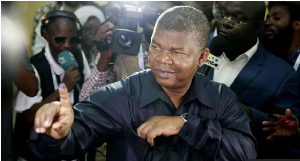Loans for Economic Resuscitation: Where is NDC Job Creation Plan? Part 2
Part one of this article introduced us to economic decisions that our government can take to accelerate the prudent policies left by NPP government. We looked at the basic organization of national economies - primary and secondary sectors; or manufacturing and services sectors - and later on incorporated micro- and macro-economics into the discussion.
It was established that, failure to comprehend the dynamics and relative functions of micro- and macro-economics in tandem, is the cause of the failure of our national economy. Misallocation of funds, in juxtaposition with waste of human resources, and sheer government folly and its inability to create jobs are the major symptoms of our current government’s failure to govern. Abandoning prudent NPP policies at the expense of the nation; and lies associated with the NDC are the dangerous pathways our nation has been forced to trek along.
We also identified many small business areas that the government can devote amount of energy, time, and finance to develop and improve on Ghanaian lives; and also advised the government to jettison pettiness, tit-for-tat attitudes, and retributive disposition which are unproductive governing strategies.
This second part will add more strategies on citizen investments to advise our dear NDC government to help it deliver on promises. The NDC government’s mediocre performance relative to national interests and loan acquisition were exposed. The latest information available states that the NDC government has successfully secured $1.27-billion and $1.17-billion loans from World Bank and International Monetary Fund (IMF) respectively. The actual amounts keep changing day-by-day for the last 30-days.
The Finance and Economic Planning Minister, Honourable Dr. Kwabena Duffour, stated and defended his government’s policies on the loans that: (1) there are no conditionalities associated with the loans; and (2) his government has focused ENOUGH resources on projects it had proposed. This author disagreed with the honourable minister on the loan conditionalities and pointed to a number of real opportunity cost issues that warrant these institutions to award loans to economies because there is no free lunch in the home countries of these financial institutions. Also, that NDC do not have any small business investment policy in existence, let alone calling it enough.
Ghanaians have already started feeling the effects of the NDC bad policies ahead of the arrival time of the loans, such as fuel increases, high electricity rates, employment freeze, etc. We now proceed from where we ended with the roles played by international financial institutions, such as IMF and World Bank in destroying economies, framed in their hidden agenda called “AIDâ€. The Kufuor administration avoided such aids and produced undisputable record in our nation’s history, but the current Mills NDC government thinks the Kufuor-led administration was very wrong for not taking the World Bank-IMF loans. Now let us see how the two sides of the argument sound.
World Bank - IMF Loans and National Development:
Professor Joseph Stiglitz, the America’s world renowned economist, who visited Ghana recently, thinks otherwise about these vampires. Joe believes that “……The IMF is not particularly interested in hearing the thoughts of its CLIENT COUNTRIES on such topics as development strategy or financial austerity. All too often, the Fund’s approach to the developing countries has had the feel of a colonial ruler. A picture can be worth a thousand words, and a single picture snapped in 1998, shown throughout the world, has engraved itself in the minds of millions, particularly those in the former colonies. The IMF’s managing director, Michel Camdessus (the head of the IMF is referred to as its MANAGING DIRECTOR), a short, neatly dressed former French Treasury bureaucrat, who once claimed to be a Socialist, is standing with a stern fact and crossed arms over the seated and humiliated president of Indonesia. The hapless president was being forced, in effect, to turn over economic sovereignty of his country to the IMF in return for the aid his country needed. In the end, ironically, much of the money went not to help Indonesia, but to bail out the COLONIAL POWER’s private sector creditors. (Officially, the CEREMONY was the signing of a letter of agreement, an agreement effectively dictated by the IMF, though it often still keeps up the pretense that the letter of intent comes from the country’s government!)……To those in the developing countries, the picture raised a very disturbing question: Had things really changed since the OFFICIAL ending of colonialism a half century ago? When I saw the pictures, images of other signings of AGREEMENTS came to mind. I wondered how similar this scene was to those marking the OPENING UP OF JAPAN with Admiral Perry’s gunboat diplomacy or the end of the OPIUM WARS or the surrender of maharajas in Indiaâ€. [Joseph Stiglitz, Globalization and its Discontents, (Penguin Books, 2002), pp. 40–41]
I have deliberately lifted the whole three-quarter page of Joe Stiglitz’s book to give flavour to my analysis here. I have also deliberately declared my source so as to disown the statement and to be off possible handcuffs from plagiarism. It must be declared once again that, I have no problem with foreign loans. However, my real problems are underlined in what the loans are meant to do; as well as the executive lies that follow them. There are several other views of foreign loans similar to Prof Joe Stiglitz‘s, but before looking at them, let me help the NDC government with economic policy decisions worth the consideration.
If I were an NDC economic policy advisor, I would be advising the president to drop all the billions of dollars from these financial institutional crooks and look at a second possible alternative such as the following: One, use our oil wealth as bait by taking off kick-backs from the table. Tell all interested parties in oil business in Ghana to develop oil-related infrastructural projects in Ghana. For example, Ghana needs petrochemical projects, such as plastics production, etc. by processing crude oil in the country to add value and jobs in Ghana.
Oil wells dry up over time but industrial assets can always be converted to other areas of national developments by generations to come. Please let our natural resources take care of the country so that the income on the crude oil does not end up as grants and subsidies to line dirty pockets through executive salaries as has happened to gold, diamond, bauxite, etc. Investors in Ghana can also be asked to adopt highways of Accra-Tema Motorway type, throughout the country, the Accra-Kumasi-Tamale-Navrongo-Burkina Faso border route most important. If President Mills really wants to be remembered with anything of significance, relative to durability, comparable to that of President Nkrumah’s Accra-Tema Motorway, then he must consider my advice seriously.
Infrastructure is the strength of any advanced nation. We sometimes proudly point to our better economies comparable to Korea, Malaysia, Singapore, etc. in the 1950s and 1960s. However, the trend changed in the 1980s, why? This is because some countries decided to invest in infrastructures, while others decided to pursue military criminalism, organized murders, tribal-inspired warfare, and all bad ways of destroying nation-building, and yet still feel proud of that. The P/NDC supervised a murderous and criminal administration for twenty years and could not develop the nation’s infrastructure over this length of time, although successfully capitalized on the sheer Ghanaian cowardice. Ghana can make unprecedented headway into instant regional superiority if a huge sum of money can be channeled into infrastructural development.
Investors would want to stay comfortably cheap anywhere and drive peacefully to work. Visitors and tourists would want to stay in a five-star hotel anywhere in the country; and also have the opportunity to use a first-class medical services, as well as decent places for entertainment, and catch their flights anywhere in Ghana. Our government can prioritize on what mechanized areas it will want to concentrate and develop them. The same thing can be done to the services sector and champion them. In this way, Ghana would be focused on what it wants to be identified with across the globe, encourage entrepreneurial investments there, and support citizens with finance to develop. The visionless NDC government, will mean a lost nation with nowhere to go. Ghana under P/NDC rule was declared a FAILED STATE in Minnesota’s Al Franken-beaten political renegade, Norman Coleman, diary. Failed economies do not exist because they do not have renowned economists like Dr. Cadman Mills, Dr. Kwabena Duffours, Genius Tsatsu Tsikatas, etc in them; rather, they exist because of bad policies, wrong choices of policy priorities, lies, and visionless team put to work.
Professor Joseph Stiglitz’s view above was too generic in the world of IMF/World Bank economics. Now let us shift the picture onto our own Ghanaian political economy. How do we see the World Bank-IMF loans? Let us work with the NDC economic perception; they may have a point to make. The Mills administration claims that it met an NPP-ransacked coffers that warranted immediate loans to allow activities to proceed. But an independent body, Oxfam, sees a different picture. “Economists at the NGO Oxfam point out that this was not caused by profligacy, but by external events last year. A further source of bitterness: if rich countries had kept their 2005 Gleneagles promises, as Britain did, Ghana would have received $1bn, with no need to borrow at allâ€.
The question is: had NPP remained in power, how would the government run the country? NPP government secured $547-million Millennium Challenge Account loan in 2007 and forced all the funds through rural agri-business investments; so where did the story end? Today, Pwalugu tomato factory has closed at the NDC watch; and employment in public sector, which drives private sector investments, has been paralyzed by the NDC. Ghana Civil Service is in complete disarray; all because of IMF and World Bank loan conditionalities. Ghana’s own academic experts from its premier university, Legon, forecast that: “Now that the private sector is collapsing, freezing employments in the public sector would not only end up in some costly financial consequences for the state as has happened in the judgment debts, but will also create upheavalsâ€.
Oxfam economists doubt very much if such cuts are needed, just a loan to tide Ghana over two years makes the “IMF too brutal … demanding balanced books within one or two years is insane. The only way to make such a deep cut is in social spending: teachers’ salaries are the main itemâ€. Is it not interesting to see the Western governments, who are the owners of these IMF and World Bank, undertaking huge fiscal stimulus programs to repair their economies? But in the developing world those same governments and institutions continue to advocate reductions, restructuring and belt tightening. Can we say with maximum confidence that these NDC-enthused foreign loans are meant to develop Ghana? Since when did the IMF loans develop any nation? These financial institutions make it categorically clear that their loans cannot sponsor infrastructures. Therefore they are not meant for development but for underdevelopment; so what are the NDC talking about? NDC bad policies are destroying the unsuspecting peaceful citizens at a terrific speed.
In short, Ghanaians cannot prevent the NDC government’s penchant for foreign loans; so what are the other protocols that we should consider? The present and future parliaments should agree with the loans and make conditionalities to these financial vampires in reverse. If they claim that they are giving us the loans with free interest rates, then we should set our own standards of conditionalities within their own set of conditionalities that will allow us to repay them at the set date of 40-years. Our set of conditionalities is infrastructural developments that will generate quick income to pay off the debt at the agreed date.
I hope I have not been selfish to my fellow citizens in government with regard to our collective responsibility to develop mother Ghana. The onus lies on the shoulders of the first gentleman of the state, who has to use his own discretion to prioritize the nation’s prerequisites. My next article will be a direct response to the Obama lecture in Ghana featuring my media interview here in what he should have said rather than his oratory raps that we did not need anyway.
Konongo Fordjour, Boston-USA Email: Koafordjour@yahoo.com
Opinions of Tuesday, 28 July 2009
Columnist: Konongo Fordjour
Where is NDC Job Creation Plan?
Opinions













